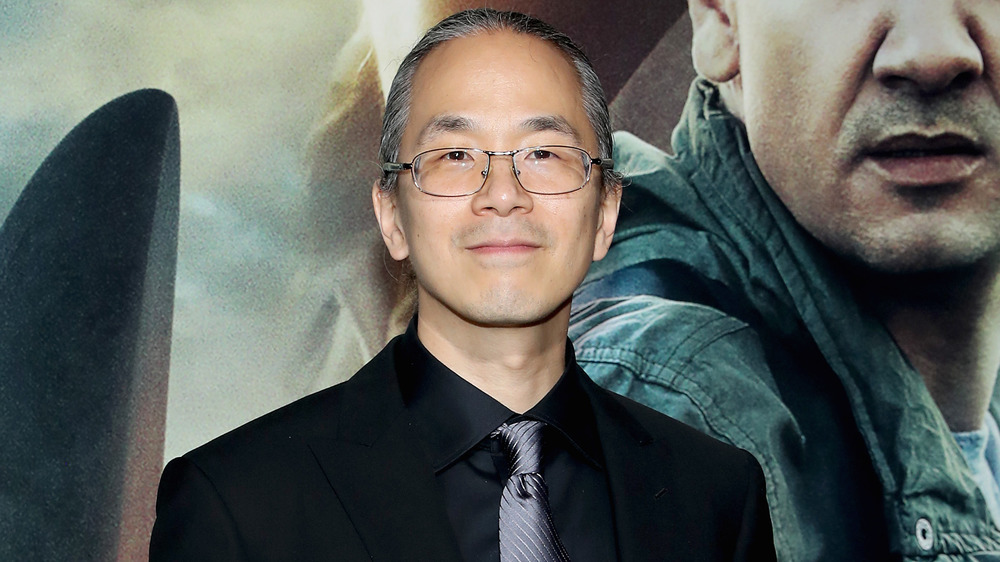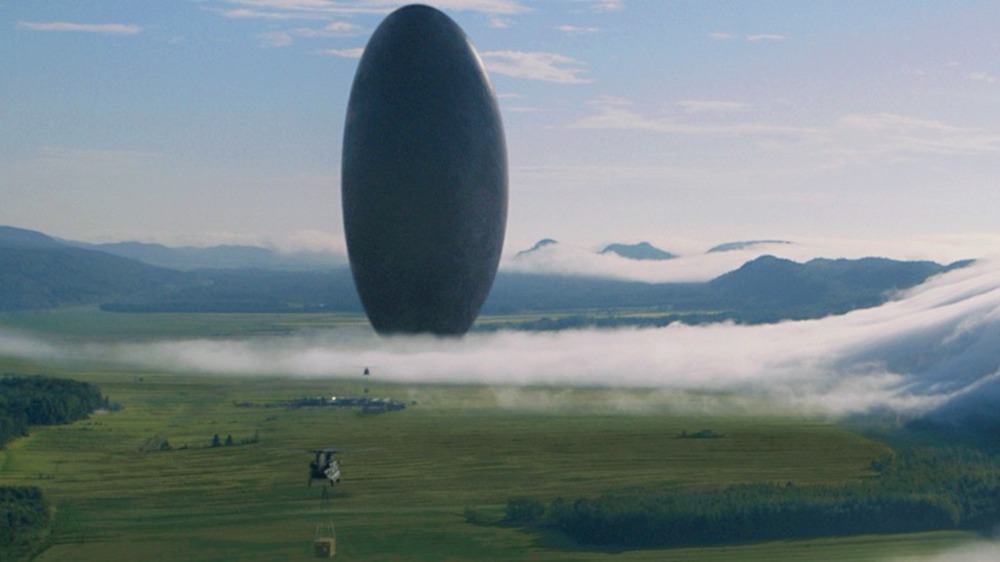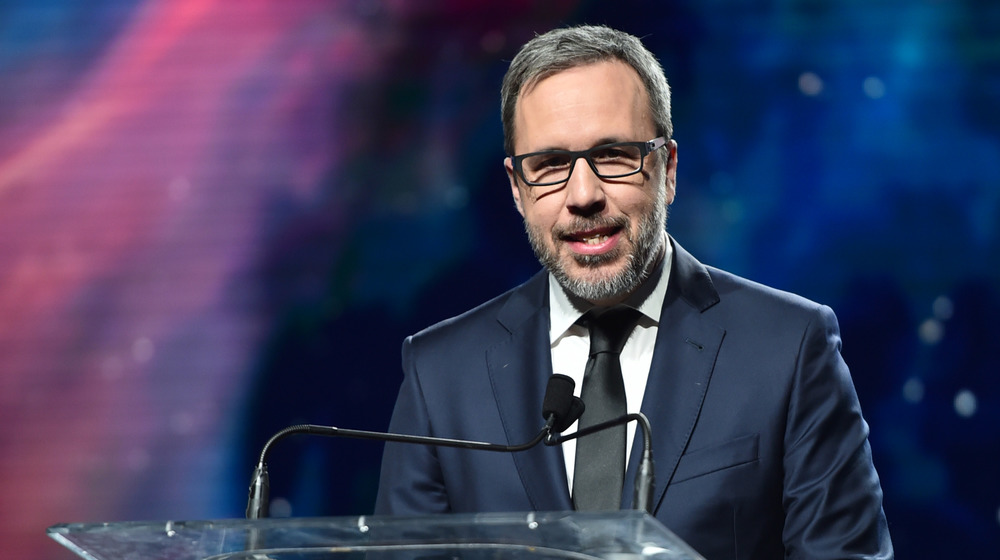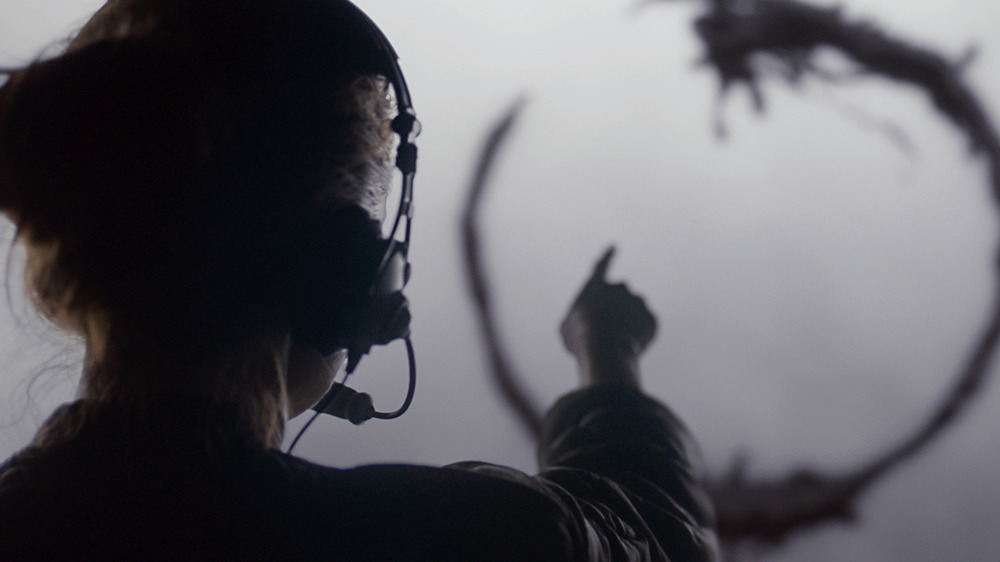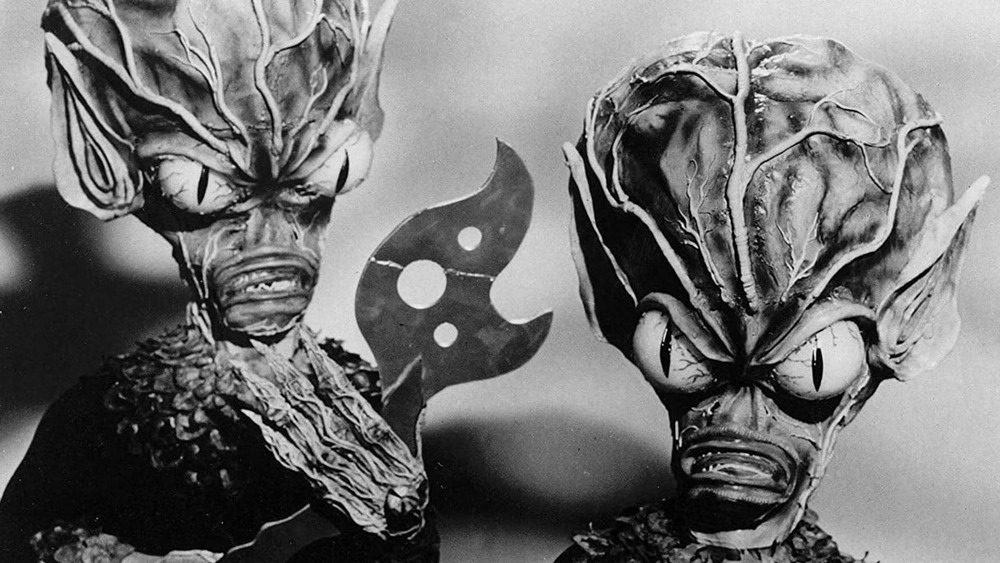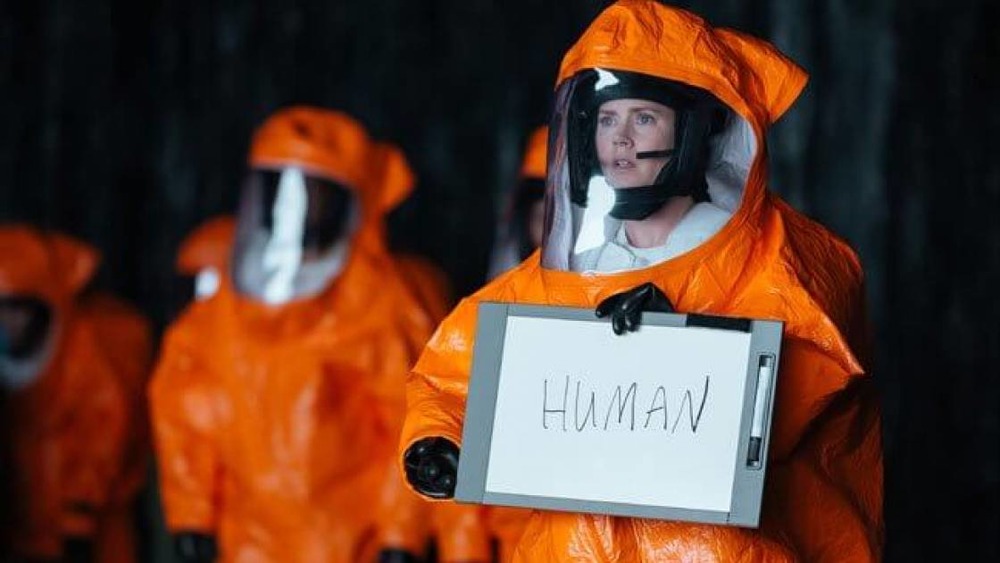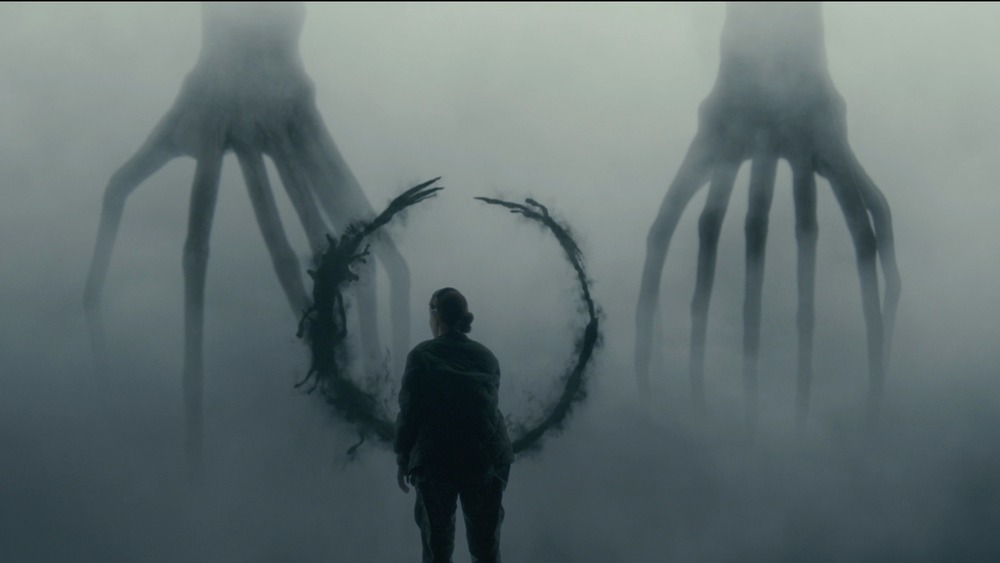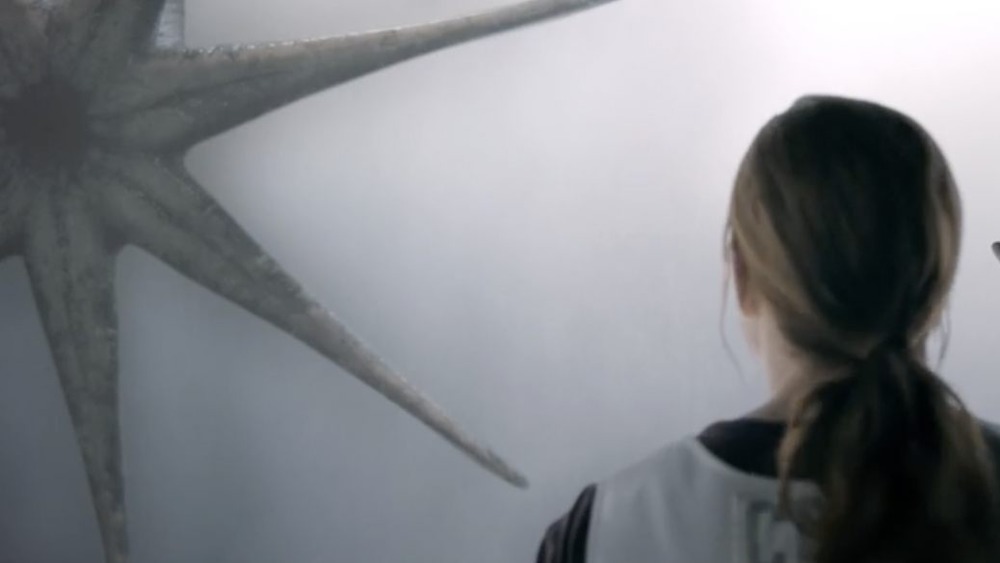Why Arrival Is The Best Sci-Fi Movie Of All Time
Science fiction movies are as old as cinema itself. A cinephile can opt for the whiz-bang action and humor of a space opera like Star Wars, or enjoy something boundary-pushing and cerebral like 2001: A Space Odyssey. Not into either of those? Not to worry: Sci-fi cinema has produced hundreds of classics over the course of the last century. We're here to champion one of the genre's more recent masterpieces as the greatest-ever sci-fi film: 2016's Arrival.
Based on an award-winning story by one of the most acclaimed sci-fi writers of the past three decades, Arrival opens with the appearance of massive alien spacecrafts over a dozen locations around the world. The film then zeroes in on efforts to establish contact with the aliens by a lonely linguist named Louise Banks (Amy Adams) and a physicist named Ian Donnelly (Jeremy Renner). As she begins to decipher the aliens' language, Louise realizes two things: These beings experience all of time — past, present and future — at once, and her own brain is being reprogrammed to do the same.
Arrival takes the basic template of a "first contact with aliens" story and turns it into an exciting and unique visual spectacle, as well as a thoughtful exploration of what it means to be human. Arrival examines how we process time, memory, existence, and loss — even when it hasn't happened yet. For those reasons, and more, we nominate Arrival as the best sci-fi movie of all time.
Literary pedigree
Arrival is based on "Story of Your Life," a 1998 novella by science fiction writer Ted Chiang. Chiang's work has been acclaimed as some of the finest modern sci-fi writing around. Chiang hasn't exactly been prolific: He's published just 17 stories in 30 years. But he's won more than a dozen awards for those select works, including multiple Hugo and Nebula Awards, the highest honors available in the field of science fiction. "Story of Your Life" nabbed him one of his Nebulas, and also earned him a Hugo nomination.
Much of the greatest science fiction ever created has come from literature — writers like Isaac Asimov, Arthur C. Clarke, Harlan Ellison, and Ursula K. Le Guin made the genre what it is today. As a result, it's always encouraging to see Hollywood turn to sci-fi prose for inspiration. Star Wars is all well and good, but the best sci-fi literature provides a solid foundation for filmmakers to build upon in a way that can truly challenge how we look at ourselves and the world.
The long and short of it
The definition of a novella is fuzzy, but basically, it's longer than a short story and yet not as long as a novel. "Story of Your Life," collected in Chiang's Stories of Your Life and Others, is around 54 pages. Often, when filmmakers attempt to adapt either a short story or a novel, they face one of two problems: Trying to stretch a short story into a feature-length film can add a lot of unnecessary padding that takes away from the main story, while attempting to compress a novel into a two-hour movie can lead to a lot of material either being removed completely or robbed of its depth and complexity.
In contrast, the novella seems to be a perfect format for movies. There's just enough material in "Story of Your Life" — a pretty dense piece of writing, even at its relatively short length — to fill out a two-hour movie, without adding or subtracting too much of what makes the story so rich and powerful in the first place. Arrival, as a result, feels like a complete, satisfying story — something we can't always say about other adaptations of sci-fi literature.
The Villeneuve factor
Arrival was directed by Denis Villeneuve, a French-Canadian filmmaker whose first films included the harrowing crime dramas Prisoners and Sicario. Despite this gritty start, Villeneuve has spent the last few years working exclusively in science fiction. He started with Arrival in 2016, directed Blade Runner 2049 the following year, and recently completed his adaptation of Dune, one of the genre's milestone novels.
"I've been dreaming [of doing] science fiction since I was 10 years old," Villeneuve mused in a documentary included on the Arrival Blu-ray. "It's [a genre] that has a lot of power and a lot of tools to explore our reality in a very dynamic way." Villeneuve has certainly done his best to live up to that lofty statement with the sci-fi he's tackled so far. Arrival is not a typical "first contact" or "alien invasion" movie by any means — it's a thoughtful take on the subject marked by unique visuals and an emphasis on both the story's scientific and humanistic qualities. He's continued that sort of exploration with the projects he's directed since Arrival's debut, all of which have roots in classic sci-fi literature. His approach to the genre may end up distinguishing him as one of its finest practitioners, up there with names like Cameron, Kubrick, and Spielberg.
Real science
Science fiction — especially the cinematic kind — doesn't necessarily have to be based on hard, provable science. But when it is, it adds a verisimilitude and plausibility that makes the story even more compelling. Much of the plot of Arrival, like the story it's based on, hinges on real science — in this case, both linguistics and physics, as well as philosophical topics like free will and determinism. It may admittedly be a little hard to follow, but the underpinnings of the story are the real deal.
Author Ted Chiang spent five years researching and familiarizing himself in the field of linguistics before attempting to write "Story of Your Life," the novella from which Arrival is adapted. "I wanted to write a story about the step that, in a lot of science fiction stories, they always skip over," Chiang detailed on the Arrival Blu-ray, "about the process of learning an alien language ... that has no basis in any human language." The research that informed his tale, along with the filmmakers' consultations with linguistics specialists on formulating how the alien language would work, gives Arrival an aspect of realism and accuracy that is the hallmark of great sci-fi.
Not your typical little green men
The aliens in Arrival are truly alien in nature. They don't look like E.T., and are a far cry from the beings who descend from the mothership at the end of Close Encounters of the Third Kind. In fact, they don't really look like anything we can comprehend. Called heptapods (due to their having seven limbs that extend from their bodies), they are much larger than humans and quite intimidating when first seen. Producer Aaron Ryder mused on the Blu-ray, "You know, you have the obligation when working in a well-worn genre to be different than those before you. What are the aliens going to look like, what are the ships going to look like ... it's an enormous burden to be original."
Arrival strives hard to be original in terms of its strange visitors, and with good reason: There is no reason to think that creatures from another world in some distant star system are going to resemble us in any way. Both science and science fiction regularly acknowledge that evolution could take untold different paths out in the cosmos — green-tinted humanoids in silver spacesuits aren't the only option, or even the most likely one.
Character counts
Too much of the time in sci-fi movies, the people are the last thing that anyone making the movie thinks about. Complex, three-dimensional characters have often been shoved aside in the pursuit of dazzling special effects and spectacular action sequences. But in Arrival, the lead characters are fully developed human beings whose lives are inextricably tied to the events of the narrative. The richness of these characters and their dynamics, and how they are affected by the events of the story, makes Arrival not just better as science fiction, but better as a human drama.
"The film is really grounded in the emotions of the characters and the emotional journey of the characters," Forest Whitaker, who plays Colonel G.T. Weber, head of the military response to the alien's landing on Earth, remarked on the Blu-ray. "Particularly, obviously, Amy's character, as she's going through this inner change. And then it's a question of us together and the relationships between us. I think that makes it human, and not as removed as some science fiction projects can possibly be."
Gender mender
Arrival is one of a small but growing handful of science fiction films to feature a woman in the lead role. Screenwriter Eric Heisserer has remarked that a number of studios offered to back the movie only if the lead was changed to a man. But the gender of the main character, linguistics expert Louise Banks, is a critical aspect of the character's identity. As Hollywood science fiction has historically relied on heroic, action-oriented male protagonists, Arrival immediately stood out by virtue of its brilliant, complex heroine.
Of course, there have been exceptions: Sigourney Weaver in the Alien franchise and Linda Hamilton in the Terminator movies come immediately to mind, as do more recent examples like Natalie Portman in Annihilation and Felicity Jones in Rogue One. But they have been, until now, the exception rather than the norm. Sci-fi literature itself has grown more diverse and inclusive in just the past decade, with female authors, writers of color, and LGBTQ scribes becoming more prevalent and celebrated. Surely the least sci-fi filmmakers could do is not have a debate over whether or not a movie should have a female lead?
"I thought it was a phenomenal part for her, and a phenomenal part for a woman," co-star Jeremy Renner said about Amy Adams' performance as Dr. Banks, "because the story was always going to be told through her eyes."
First contact
Our first meeting with alien visitors has been portrayed in many different ways on screen, ranging from the total destruction of human civilization to little boys bonding with beings from another world. But Arrival is one of very few movies to paint a truly realistic picture of how our first interaction with emissaries from a non-human civilization might impact our species and culture. It isn't always pretty. "It's a massive existential crisis for any religious people that think we are the center of the world," pondered Denis Villeneuve. "We are afraid of things that are different, things that are out of our consciousness or our imagination."
Very few actual studies have been done to determine how humanity might respond to contact with extraterrestrial life, but Arrival postulates a mix of military and scientific observation, followed by genuine efforts to establish contact. As the intent of these aliens seems to take on a sinister cast, humans respond predictably, with terrorism, looting, threats of military engagement, and ultimately, each nation deciding to fend for itself. Luckily, no one drops an atomic bomb on the alien spacecraft, as they did on the truly hostile invaders of The War of the Worlds or Independence Day, and there is a degree of restraint on the part of major governments. That's probably the best we could hope for, and Arrival is dead-on in its depiction of that possibility.
Mind, blown
At the heart of Arrival is a concept that is almost too much to get our heads around: Through their unique language, the heptapods are able to see all of time, all at once. Any being with knowledge of their language gains a similarly altered perception of time, becoming able to experience all events simultaneously. This is how the heptapods know that in 3,000 years time, they'll require help from humanity — which is why they have come to Earth to begin sharing their perception with us, through their language. This is also how Louise Banks learns that her daughter will die young from an incurable disease, despite the fact that her daughter hasn't even been born.
This is the kind of idea that great science fiction is built around: A theory or notion that alters our own perception of the world, opening our minds in fantastic new ways as we read, watch, or play. There are plenty of terrific ideas in science fiction, but very few are explored so well as to have that brain-expanding effect. Films like 2001: A Space Odyssey, Forbidden Planet, Ex Machina, and Children of Men pull that sort of brilliance off, and now Arrival joins that vaunted list.
The human condition
"There are hard sci-fi stories that translate well to film," screenwriter Eric Heisserer remarked. "Usually [it's] when the movie is a study of human behavior, a snapshot of what's going on in our society or our culture or our politics." At its best, science fiction challenges the way we look at ourselves through these means. Arrival does just that with sublime skill. It's a credit to both the clarity of Ted Chiang's story and the talent of the filmmakers involved that the movie places complex ideas about time, perception, and memory inside a story about people striving to connect, as people always have.
Arrival takes humanity on a mysterious, and, at times, frightening journey, but ends on an optimistic note. By the end of the film, the world has unified following the appearance of the aliens, having realized that humanity is part of a much larger universe. But more importantly, the human race — in the form of Louise Banks — has taken an important step forward in its own evolution. By deciphering the aliens' language, Louise has changed her own perception of time, and knows that terrible tragedy lies ahead in her own life. She chooses to accept this loss, acknowledging that it's better to embrace the experiences of her life rather than struggle against them. That is the gift that the heptapods leave to humanity. It's a profound, moving one, and it elevates Arrival to the top echelon of science fiction cinema.

